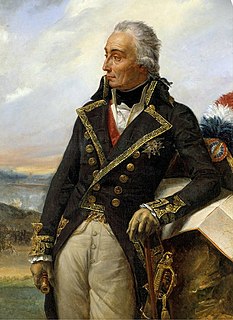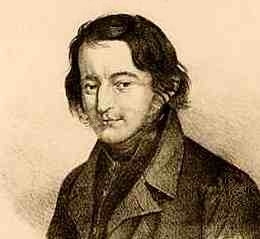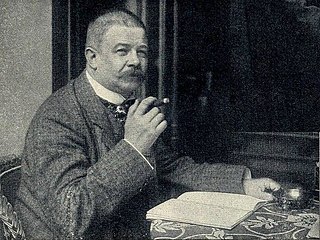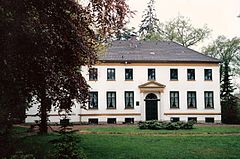
Nicolas, Count Luckner was a German officer in French service who rose to become a Marshal of France.

Ludwig Häusser was a German historian.

The Jauch family of Germany is a Hanseatic family which can be traced back till the Late Middle Ages. At the end of the 17th century the family showed up in the Free Imperial and Hanseatic City of Hamburg. The members of the family acted as long-distance merchants. They became hereditary grand burghers of Hamburg and were Lords of Wellingsbüttel Manor – nowadays a quarter of Hamburg.

Friedrich Karl Ludwig of Schleswig-Holstein-Sonderburg-Beck was the ninth and penultimate Duke of Schleswig-Holstein-Sonderburg-Beck. Friedrich Karl Ludwig was the son of Prince Karl Anton August of Schleswig-Holstein-Sonderburg-Beck and his wife Countess Charlotte of Dohna-Schlodien.

William III (1375 – 12 September 1435;, was Duke of Bavaria-Munich, together and in concord with his older brother Ernest, Duke of Bavaria. William III was a son of John II and a member of the Parakeet Society.

The Free Workers' Union of Germany was an anarcho-syndicalist trade union in Germany. It stemmed from the Free Association of German Trade Unions (FDVG) which combined with the Ruhr region's Freie Arbeiter Union on September 15, 1919. The FAUD was involved in the revolution in Germany from 1918–1923, and continued to be involved in the German labor movement after the FAUD began to decline in 1923. After 1921, the FAUD added an "AS" to their name, signifying a full transition from simple syndicalism to anarcho-syndicalism. This also led to further difficulties between the intellectual elites of the FAUD (AS), such as Rudolf Rocker, and the rank and file workers, mostly in the Ruhr, who were more worried about "bread and butter" issues than anarchist political activities. These workers, the majority of the FAUD-(AS) members, formed the Gelsenkircherichtung within the movement, and given the movements federalist structure, began to drift away from the FAUD-(AS) intellectually and organizationally. Eventually, those workers who had joined during the revolution left the movement and the remaining FAUD-(AS) members came from the FDVG's original constituencies of the building trades and specialized textile workers. The Nazis suppressed the FAUD in January 1933 after coming to power. However, many of its members continued to do political work illegally and organized resistance against the Nazi regime, both in Germany and elsewhere. The International Workers' Association, of which the FAUD was a member, was founded upon the initiative of the German organization in 1922. The Free Workers' Union (FAU), which was founded in 1977, sees itself in the tradition of the FAUD. At its peak, the FAUD had 150,000 members. The primary organ of the FAUD was the newspaper Der Syndikalist, which was first published in December 1918, and continued until the groups suppression by the Nazis.

Lasbek is a municipality in the district of Stormarn, in Schleswig-Holstein, Germany.
Dietrich Hermann Hegewisch was a German historian who was a native of Quakenbrück. He was the father of political publicist Franz Hermann Hegewisch (1783-1865).
Christian Wilhelm von Schütz was a German author.

Wellingsbüttel Manor is a former manor with a baroque manor house in Hamburg, Germany, which once enjoyed imperial immediacy (Reichsfreiheit). Wellingsbüttel was documented for the first time on 10 October 1296. Since 1937 it has formed part of the suburbs of Hamburg as the heart of the quarter of the same name, Wellingsbüttel, in the borough of Wandsbek. The owners of Wellingsbüttel Manor from the beginning of the 15th until the early 19th century were consecutively the Archbishops of Bremen, Heinrich Rantzau, Dietrich von Reinking, the Barons von Kurtzrock, Frederick VI of Denmark, Hercules Roß, the Jauch family, Cäcilie Behrens and Otto Jonathan Hübbe. In the early 19th century it was the residence and place of death of Friedrich Karl Ludwig, Duke of Schleswig-Holstein-Sonderburg-Beck, the penultimate duke, who was an ancestor inter alia of the present-day British royal family. Wellingsbüttel Manor was elevated to the status of a Danish "chancellery manor" (Kanzleigut). It was then acquired by Grand Burgher of the Free and Hanseatic City of Hamburg Johann Christian Jauch junior (1802–1880), becoming a country estate of the Jauch family. The manor house is together with Jenisch House (Jenisch-Haus) one of Hamburg's best conserved examples of the Hanseatic lifestyle in the 19th century and jointly with the manor gatehouse a listed historical monument. The estate is located on the banks of the Alster River in the middle of the Alster valley (Alstertal) nature reserve.

Friedrich Ludwig Weidig was a German Protestant theologian, pastor, activist, teacher and journalist. Initially working as a teacher in Butzbach, he then spent a short time as a pastor in Ober-Gleen, a district of Gießen. In what is now Hesse and the Middle Rhine, he was one of the main figures of the Vormärz and a pioneer of the 1848 Revolution.

Johann Erich Biester was a German philosopher. With Friedrich Nicolai and Friedrich Gedike, he formed what was known as the 'Triumvirate' of late Enlightenment Berlin.

Ludwig Julius Eisenberg was an Austrian writer and encyclopedist. He wrote a lexicon of stage artists, among other publications.
Egon Voss is a German musicologist, who is particularly known for his contributions to Richard Wagner research.

Berthold Litzmann was a professor of German studies and a literature historian. He was a professor at the University of Bonn and the founder of the Society for Literature History, which also included Thomas Mann.
Walther Rehm was a German literary scholar.

Karl-Heinz Reinfandt is a German musicologist and music educator.
Hans-Georg Herrlitz is a German educator.
Rudolf Bülck was a German librarian.















